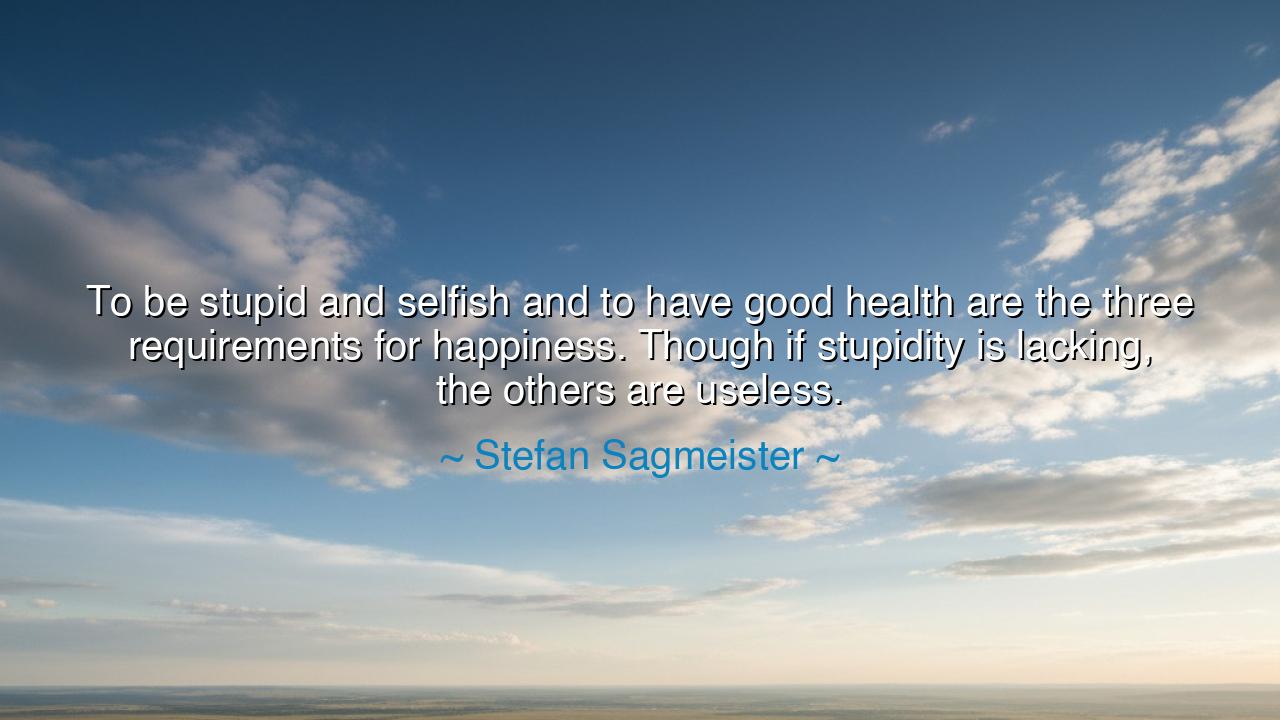
To be stupid and selfish and to have good health are the three
To be stupid and selfish and to have good health are the three requirements for happiness. Though if stupidity is lacking, the others are useless.






In the piercing and paradoxical words of Stefan Sagmeister, artist and philosopher of design, we find a reflection that is both humorous and profound: “To be stupid and selfish and to have good health are the three requirements for happiness. Though if stupidity is lacking, the others are useless.” At first glance, these words seem to mock human nature — to suggest that ignorance, not wisdom, is the path to joy. Yet, beneath this jest lies a truth that has haunted the thinkers of every age: that knowledge, when untempered by simplicity, can become a burden, and that overthinking often imprisons the heart that seeks to be free. Sagmeister, with the wit of a sage cloaked in irony, reminds us that happiness is not always the child of intelligence, but of acceptance — the rare art of being content within the imperfection of life.
The ancients knew this paradox well. The Stoics taught that to seek peace, one must cease to wrestle with what cannot be controlled. Epicurus, the philosopher of gardens and laughter, said that the secret of happiness lay not in wisdom’s complexity but in the simplicity of desire: food for hunger, friendship for the soul, and calmness for the mind. Sagmeister’s “stupidity” is not the dullness of mind, but the innocence of heart — the ability to let go of needless worry, to stop dissecting every sorrow, and to live unburdened by the weight of overthought. It is a playful yet tragic truth: those who think too much about happiness are often the ones who never find it.
His mention of selfishness too must be understood in this ancient light. Not the selfishness of greed or cruelty, but the self-regard necessary to care for one’s own well-being. In the modern age, people often martyr themselves to ambition, duty, or comparison, forgetting that happiness begins with self-respect. To love others truly, one must first have strength within. Sagmeister’s “selfishness” is the self-awareness to protect one’s own spirit — to rest when weary, to say no when burdened, to cultivate joy without apology. It is a reminder that even compassion must flow from a full vessel.
And what of health, the third pillar of Sagmeister’s trinity? Here the wisdom is plain: a body in torment rarely allows the soul to sing. The ancients built their philosophies upon the harmony of body and spirit. The Greeks saw the gymnasium not as a place of vanity, but of spiritual discipline — where the care of the body mirrored the care of the mind. Without health, the simplest pleasures fade; bread loses its sweetness, the morning sun its warmth. Thus, health is not merely physical, but emotional and mental — a balance that enables life’s small joys to be felt deeply.
Yet Sagmeister ends with the blade of irony: “Though if stupidity is lacking, the others are useless.” In this, he reveals his jesting wisdom — for it is the curse of the wise to see too much, to think too deeply, to understand the fragility of all things. The clever see the flaws in happiness, while the simple experience it without question. The philosopher asks, “What is joy?” — and by the time he defines it, it has already flown. Thus, Sagmeister’s “stupidity” becomes a kind of divine foolishness, the courage to live in the present, to delight in the moment without dissecting it, to dance even when the music will soon end.
History gives us examples aplenty. Consider Diogenes, the wandering philosopher of Athens, who lived in a barrel and mocked the powerful. When asked by Alexander the Great what he desired, he replied only, “Stand out of my sunlight.” To the world, he was a fool — poor, homeless, unambitious. Yet within his “foolishness” lay a freedom kings could never buy. His simplicity was his strength; his lack of need, his abundance. In this way, he embodied Sagmeister’s paradox: the wisdom of happiness often appears as foolishness to those who chase it too hard.
The lesson is not to abandon intelligence, but to learn the wisdom of unknowing — to balance reason with wonder, intellect with ease. Think, but do not drown in thought. Care for others, but not so much that you forget yourself. Tend your health, not as vanity, but as reverence for the life you have been given. And above all, do not seek happiness as a treasure to possess, but as a rhythm to dance to — fleeting, imperfect, and beautiful.
So, my children of the restless age, heed Stefan Sagmeister’s paradoxical truth. The happy life is not the most intelligent, but the most present. It belongs to those who can laugh at their mistakes, forgive their flaws, and find wonder in the ordinary. Be wise enough to live simply, and foolish enough to live fully. For in that delicate balance — between knowing and not caring to know — lies the art of being truly, gloriously alive.






AAdministratorAdministrator
Welcome, honored guests. Please leave a comment, we will respond soon